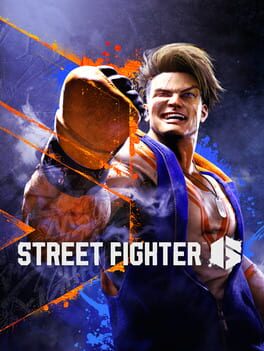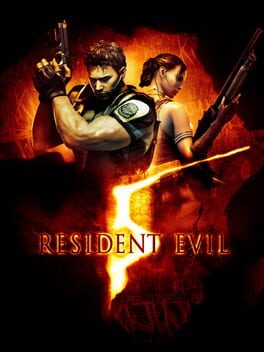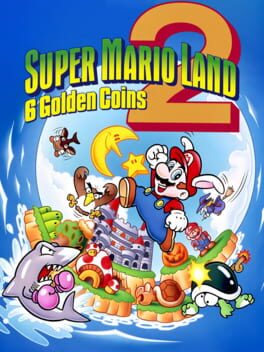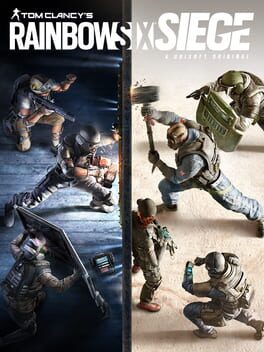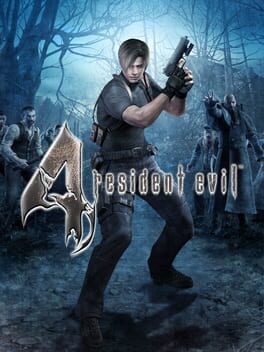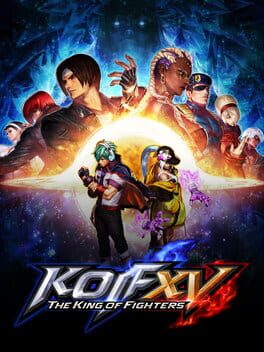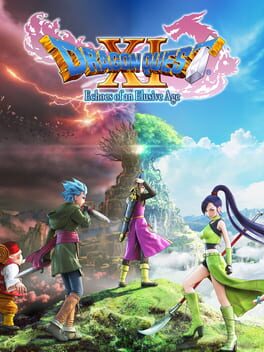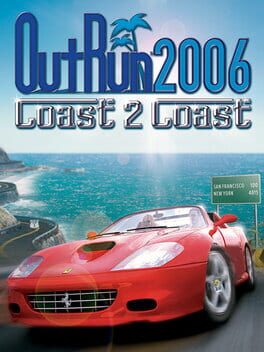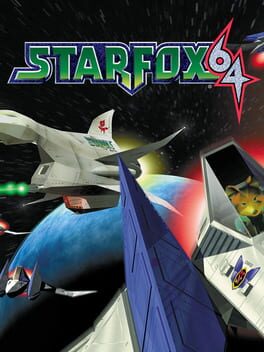taigamask
2023
2009
played most of the campaign with KB0 as well as some beginning stages with some online randos
fun as dumb co-op bullshit but i can't justify giving it a positive rating on account of it not being good, or well made
wesker has that unspoken 2009 rizz though. mercenaries is fun. they should just move the game to australia or something in the remake
fun as dumb co-op bullshit but i can't justify giving it a positive rating on account of it not being good, or well made
wesker has that unspoken 2009 rizz though. mercenaries is fun. they should just move the game to australia or something in the remake
one of the side effects of the brand-ification of mario as nintendo’s flagbearer is that we’re probably not gonna get any games as comparatively offbeat and goofy (quirky dare i say :3) as this any time soon. just some really silly stuff happening here. mario goes into a haunted house and you have to avoid goombas in jason masks with lil knives sticking out of them. mario goes into a bigger mario and the final bosses of that world are the three little pigs. if you get a game over the game says fuck you and makes you go through each boss stage over again but it doesnt matter too much because you can grind enough coins to buy enough extra lives to max out the counter pretty easily. wacky stuff. i played this in my hotel room over a weekend of traveling so it was a decent way to kill some time in the hours before i fell asleep
2022
This review contains spoilers
One of the best and most innovative JRPGs of all time that disguises itself as way more unassuming than what it is. It absolutely revels in subverting player expectations and mixing genre forms; so much so that I feel like I can’t talk about it at all without spoiling what are some of the coolest gameplay setpieces in the genre.
(but i will anyway)
The entire anthology of mini-RPGs the game bases its whole schtick around makes Live A Live a veritable love letter to video games the same way something like Cinema Paradiso is a love letter to film.
I’d recommend going into this game completely blind so you get what I’m sure is the dev team’s full, intended experience, but if you’re curious as to what some of these chapters actually entail, my personal rankings are:
1. Distant Future: Eschews standard JRPG progression and battles completely in favor of an atmospheric, exploratory narrative that takes inspiration from Alien and 2001: A Space Odyssey.
2. Feudal Japan: A single-man raid on a castle where you can choose to infiltrate stealthily or kill all the inhabitants, with multiple routes of infiltration to choose from; years before games like Thief and Deus Ex would popularize the immersive sim genre, and on much less powerful hardware.
3.Imperial China: Aging kung fu master decides he needs to find and train disciples as his last mission in life before passing on. Has a very inspired, affecting twist midway through.
4. Wild West: Seven Samurai/The Magnificent Seven-inspired western where a wanted man and a bounty hunter team up to protect a town from being ransacked by a gang of bandits. The Sundown Kid is so cool. Mad Dog is so cool.
5. Near Future: Suffers from some pacing issues, but the most bombastic chapter at its highest points, taking inspiration from mecha anime and tokusatsu series of the 70s and 80s. Has a LOT going on. Extremely fun final sequence.
6. Prehistory: Cute! An entire chapter featuring nonverbal cavemen, instead opting to use expressive 2D sprites and grunts to tell a story about love conquering all. This probably would have been more effective if I had played the original game with its hardware limitations, but this was still fun.
7. Modern Day: Not bad, just not a whole lot to speak of here. Grafts the RPG-grid combat of the game onto the UI of a fighter a la Street Fighter II as your player-character fights combat masters to learn from them and take their skills as his own (I’ve heard the remake actually bogged down this part a lot so it’s not as much of a gauntlet, which also explains some things). Also, having Yoko Shimomura write compositions for a SFII sendup in her first job at Square after leaving Capcom was also something I thought was kind of funny.
The remake and its additions, headed up by original-director-now-supervising-producer Takashi Tokita, similarly feel like a labor of love; almost uncharacteristically gorgeous environments in the HD-2D style, meta-storytelling through loading screen blurbs that actually made me tense up at times and an entire Mazinger Z-inspired chapter opening – complete with vocals from anime stalwart Hironobu Kageyama – were some highlights.
If the game were just a sequence of these vignettes completely separated from one another, it’d still be a pretty cool little experience. But the coup de grace of the whole thing is saved for the penultimate chapter.
Some context: Dragon Quest, the first game in the now-acclaimed series that created the standards of JRPGs as we know them, was released in 1986. Five games in the series were released before Live A Live’s original Japanese release date in 1994.
By that point, a basic narrative trope in JRPGs in the Dragon Quest vein had emerged: you’re a chosen hero on a quest to rid the kingdom of some ancient, omniscient evil. Pretty standard stuff, constrained to basics because of the hardware of the Famicom. But they were basics done particularly well:
“Dragon Quest II is the most influential game,” said Tokita in a 2011 interview with Playstation Lifestyle. “It really showed me how traumatic an RPG could be. “There is a part where you are looking for your second party member for a long time and you are exhausted and you can’t find him. You come back to your camp and he is there sleeping and you get really pissed off, but you bring him into battle and he cures you and is really reliable. That was when I saw how the storyline of an RPG can do so much and can tell so much.”
The Middle Ages chapter not only subverts the chosen-one expectations of Live A Live’s predecessors, but also showcases Tokita’s philosophy of the genre. It’s one of the most interesting takes on some now commonly-established genre standbys I’ve seen in the medium.
Aside from the basic tropes - you have to save the princess from your foe and the kingdom from ruin - there’s no sense your character is motivated by anything other than what the game itself is telling you to do. He’s on a quest to be a hero simply because of a “destiny” the game lays out for him.
It’s only during the chapter’s climax that we see our character’s personality: arrogant and hypercompetitive, relying on his comrades to do much of his work while he receives the endgame glory.
His eventual betrayal and downfall because of these traits leads to one of the most interesting, nuanced final villains in a game. It’s an incredible subversion of JRPG tropes and the player-character power fantasy that feels incredibly well-earned.
To contrast, every other chapter allows its hero some agency, a clearly laid out reason for why they become heroes in the first place - a sense of duty, survival, love, etc. And despite being player characters, they aren’t silent protagonists (except for the two who literally can’t speak, but they’re able to convey emotions otherwise).
Some more context, as an aside: Takashi Tokita worked sparingly on the first three Final Fantasy games before becoming the lead designer on Final Fantasy IV, released in 1991. It took him being in charge of one game before knowing exactly what the JRPG genre was all about and being able to bend the entire genre to his whims. He also had help from scenario writer Nobuyuki Inoue, who would become the director of Mother 3 years later. GOAT shit.
I could write more about this if I wanted to from a gameplay perspective, but I’d like to play the original for myself and do some comparisons before tackling that.
THAT BEING SAID:
Some decisions, like one to include a radar that always nudges you to the story’s next checkpoint, seem to water down some of the sections that focus on player exploration vs linear progression, but I’m interested in seeing how the original game plays out without it and whether that inclusion was actually justified.
I know some real Live A Live heads from back in the day weren’t happy with some of the localization choices here, either (specifically one from the prehistory chapter that really bogs down its intended ending).
There were some pacing issues I also had in certain chapters as well, where some points would completely bring the forward momentum of a story to a halt. Grindy bits in JRPGs are fine with me – they’re JRPGs, after all – but in the context of Live A Live, where the story pacing is otherwise lightning fast, it became kind of a bummer when I wanted to see what would happen next.
Irks aside, though, this is one of those games I could see myself giving five stars to if it sticks with me long and hard enough. It’s tough to sell how much Live A Live loves video games and the people who play them over the written word.
2023
Dudes rocking is back on the menu.
Not quite sure I like this as much as the original but I still had a total blast. Presentation-wise there’s enough fun stuff here that makes it worth playing even if you’re in the same frame of mind as me. There was definitely a deliberate choice made to make this version more palatable to the more cinematic, immersive experience that audiences writ large are flocking to with their AAA game releases.
That kind of supplants the original’s more arcade-y feel, which is fine and the gameplay still stands tall on its own. My real big complaint here is that this shift really reduces the amount of actual encounters in favor of exploration, especially in the early-game village segment. It’s Resident Evil 4! Just let me shoot things. That being said, this does become less of a problem as the game progresses, and those RE Engine-crafted environments look gorgeous, so it’s not the worst thing in the world.
It also feels like there’s a bit less precision on where your shots are going but the guns still feel pretty good (though it did take a bit of adjusting coming right off a vanilla playthrough, especially with regards to how the Ganados react to your attacks, limb shots, etc). Melee attacks are also meaty and satisfying.
Speaking of, the added focus on melee attacks/parries is a pretty neat change and one that differentiates the core gameplay loop enough to where combat does feel different enough from RE4 ‘05. This shift is also really welcome in certain encounters against tougher enemies; parrying an attack from a Garrador or an axe in midair is one of the most satisfying things I’ve done in a game in recent memory.
And though I do prefer vanilla RE4 overall, there are certain sections and setpieces here that do end up outshining the original. Some immediate examples I can think of include the cabin sequence and the castle minecart bit, and some of the decisions the dev team made to streamline the stages a bit are very much welcome. I didn’t even realize they had cut one of the late-game bosses until it was pointed out to me.
As far as character writing goes, I thought Luis and Ashley were the real standout improvements. The extended sequence with Luis really helped add depth and charm to a character that had like, four scenes in the original game. And as someone who already liked the original Ashley more than a solid amount of people seem to, everything about her characterization in the remake really endeared her to me. The decision by the devs to keep her around Leon for more extended periods of the game really paid off, too. Getting to see the duo’s bond solidify as the story progresses was a great touch.
The villain stable, though, actually felt weaker to me this go-around (except for Krauser, who decided to lean even further into being Leon’s Vergil-equivalent, which rules). I think this is a casualty of Capcom wanting the REmakes to be a little more grounded (as far as that goes with this series). We don’t get any of the one-liners or codec banter from Salazar or Saddler, which really bummed me out. Salazar in particular had his goofy Saturday-morning-cartoon-esque monologues totally watered down this go-around. The villains calling Leon just to talk shit like a demented wrestling heel was a highlight of the original games for me, and having that aspect completely removed was disappointing. Their presence here isn’t bad by any means, but it does feel like Capcom left a lot on the table (again, except with Krauser, who rules).
I’ll probably need to do another playthrough on hardcore or professional mode to really cement my opinion on RE4make, but these are my general thoughts after a 16-hour playthrough on standard difficulty.
Not quite sure I like this as much as the original but I still had a total blast. Presentation-wise there’s enough fun stuff here that makes it worth playing even if you’re in the same frame of mind as me. There was definitely a deliberate choice made to make this version more palatable to the more cinematic, immersive experience that audiences writ large are flocking to with their AAA game releases.
That kind of supplants the original’s more arcade-y feel, which is fine and the gameplay still stands tall on its own. My real big complaint here is that this shift really reduces the amount of actual encounters in favor of exploration, especially in the early-game village segment. It’s Resident Evil 4! Just let me shoot things. That being said, this does become less of a problem as the game progresses, and those RE Engine-crafted environments look gorgeous, so it’s not the worst thing in the world.
It also feels like there’s a bit less precision on where your shots are going but the guns still feel pretty good (though it did take a bit of adjusting coming right off a vanilla playthrough, especially with regards to how the Ganados react to your attacks, limb shots, etc). Melee attacks are also meaty and satisfying.
Speaking of, the added focus on melee attacks/parries is a pretty neat change and one that differentiates the core gameplay loop enough to where combat does feel different enough from RE4 ‘05. This shift is also really welcome in certain encounters against tougher enemies; parrying an attack from a Garrador or an axe in midair is one of the most satisfying things I’ve done in a game in recent memory.
And though I do prefer vanilla RE4 overall, there are certain sections and setpieces here that do end up outshining the original. Some immediate examples I can think of include the cabin sequence and the castle minecart bit, and some of the decisions the dev team made to streamline the stages a bit are very much welcome. I didn’t even realize they had cut one of the late-game bosses until it was pointed out to me.
As far as character writing goes, I thought Luis and Ashley were the real standout improvements. The extended sequence with Luis really helped add depth and charm to a character that had like, four scenes in the original game. And as someone who already liked the original Ashley more than a solid amount of people seem to, everything about her characterization in the remake really endeared her to me. The decision by the devs to keep her around Leon for more extended periods of the game really paid off, too. Getting to see the duo’s bond solidify as the story progresses was a great touch.
The villain stable, though, actually felt weaker to me this go-around (except for Krauser, who decided to lean even further into being Leon’s Vergil-equivalent, which rules). I think this is a casualty of Capcom wanting the REmakes to be a little more grounded (as far as that goes with this series). We don’t get any of the one-liners or codec banter from Salazar or Saddler, which really bummed me out. Salazar in particular had his goofy Saturday-morning-cartoon-esque monologues totally watered down this go-around. The villains calling Leon just to talk shit like a demented wrestling heel was a highlight of the original games for me, and having that aspect completely removed was disappointing. Their presence here isn’t bad by any means, but it does feel like Capcom left a lot on the table (again, except with Krauser, who rules).
I’ll probably need to do another playthrough on hardcore or professional mode to really cement my opinion on RE4make, but these are my general thoughts after a 16-hour playthrough on standard difficulty.
2011
probably the most replayable game of all time, ESPECIALLY on professional difficulty. locking in the game's difficulty slider really makes you hyper aware of your situation at all times and not only makes things more tense but it also kind of forces you to use all of leon's resources and game mechanics to their fullest (my favorite is capping a ganado in the knee and making them fall over).
you can say that about any game's hard mode i guess but when the mechanics are as airtight as RE4's it makes everything about controlling leon even more satisfying than it already was playing on normal
you can say that about any game's hard mode i guess but when the mechanics are as airtight as RE4's it makes everything about controlling leon even more satisfying than it already was playing on normal
2001
once when i was like 11 or 12 or something i was at this christian summer camp and some kid was being mean to me and making fun of me etc and i got mad and picked up a small rock from the ground and threw it at his back and a bunch of camp counselors saw and i got in trouble and one of the counselors sat me down and said what i did wasnt very christ like and made me feel guilty about it and i cried about it all day. and then for about a week or two i tried to atone for my sins by reading the bible but it was the old timey king james translation and it didnt really make sense to me so i gave up and became an atheist. so i relate to james in that sense
not sure i like this as much as other JRPG-heads but still a very comfy and charming game and i had a fun time. plot was VERY standard to me and i get the sense it was made to be appreciated by DQ-heads more than anyone else but the different mini-arcs you get from traveling the world and talking to NPCs are still enjoyable in the same way a bedtime story or one-off anime episode is
koichi sugiyama can suck my nuts i would have muted this game but im a freak for wanting to hear voice acting in games that have them so i didn't unless i was grinding or something
koichi sugiyama can suck my nuts i would have muted this game but im a freak for wanting to hear voice acting in games that have them so i didn't unless i was grinding or something
1997
2006
2011
